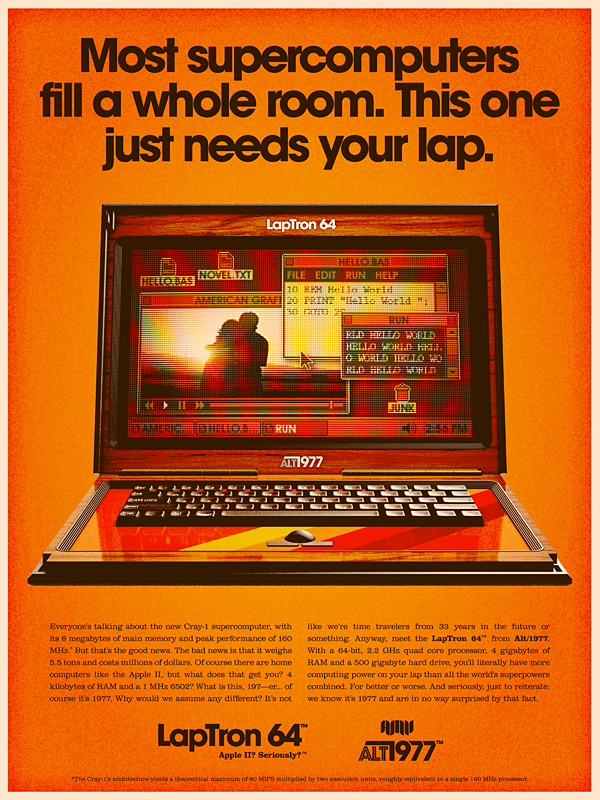2 Aug 2010 - permalink
Color cycling is an effect used widely in games of the 90s to create the illusion of animating backgrounds by changing only the colors used in a single image. The backgrounds for the classic LucasArts games are masterly done using color cycling.
Joe Huckaby has created an HTML5 implementation of color cycling using a few of Mark Ferrari’s fabulous images. Ah, the memories…
1 Jul 2010 - permalink
Vanity Fair:
When V.F. asked 52 experts to choose the five most important works of architecture created since 1980, they named a staggering 132 different structures. Here are the top 21, in order of popularity.
Many of these are remarkable from an engineering view as well.
1 Jul 2010 - permalink
iFixit has a teardown of the gyroscope inside the new iPhone 4. The images are stunning examples of the remarkable expertise and precision required to build the devices we have come to think of as everyday things. To think it started only 50 years ago with the invention of the transistor…
1 Jul 2010 - permalink
Talking at RSA, Philip Zimbardo explains some absolutely amazing correlations between how we perceive time and how we interact with others and the world. Discoveries like this ought to have profound implications on how we structure our society.
There’s a 10 minute animated extract for those with short attention spans :)
30 Jun 2010 - permalink

What would you do if you could travel back in time? Assassinate Marilyn Monroe? Go on a date with Hitler? Obviously. But here’s what I’d do after that: grab all the modern technology I could find, take it to the late 70’s, superficially redesign it all to blend in, start a consumer electronics company to unleash it upon the world, then sit back as I rake in billions, trillions, or even millions of dollars.
Seriously cool!
30 Jun 2010 - permalink
Interview with Gail Dines about her new book Pornland:
Pornography, like all images, tells stories about the world. It tells stories about women, men, sexuality, and intimacy. In pornography, intimacy is something to be avoided, and—as I say in the book—“In pornography nobody makes love. They all make hate.” The man makes hate to the woman’s body. It’s about the destruction of intimacy.
30 Jun 2010 - permalink
Paul Greenberg writes for The New York Times about the declining population of Tuna:
But appetites continued to outstrip supply. Global seafood consumption has increased consistently to the point where we now remove more wild fish and shellfish from the oceans every year than the weight of the human population of China.
Tuna then are both a real thing and a metaphor. Literally they are one of the last big public supplies of wild fish left in the world. Metaphorically they are the terminus of an idea: that the ocean is an endless resource where new fish can always be found. In the years to come we can treat tuna as a mile marker to zoom past on our way toward annihilating the wild ocean or as a stop sign that compels us to turn back and radically reconsider.
We seriously need to reconsider what we eat or there will be none.
30 Jun 2010 - permalink
Astute analysis by A. J. Patrick Liszkiewicz of the psychology in Farmville (yet another social game I’ll never play) and why we need time to think:
The secret to Farmville’s popularity is neither gameplay nor aesthetics. Farmville is popular because in entangles users in a web of social obligations. When users log into Facebook, they are reminded that their neighbors have sent them gifts, posted bonuses on their walls, and helped with each others’ farms. In turn, they are obligated to return the courtesies. As the French sociologist Marcel Mauss tells us, gifts are never free: they bind the giver and receiver in a loop of reciprocity. It is rude to refuse a gift, and ruder still to not return the kindness.[11] We play Farmville, then, because we are trying to be good to one another. We play Farmville because we are polite, cultivated people.
29 Jun 2010 - permalink
Everyone should read this. There’s a real risk of finding oneself in a sick relationship or employment at some point in life – or knowing someone who is:
Make sure there’s never quite enough money, or time, or goods, or status, or anything else people might want. Insufficiency makes sick systems self-perpetuating, because if there’s never enough ______ to fix the system, and never enough time to think of a better solution, everyone has to work on all six cylinders just to keep the system from collapsing.
24 Jun 2010 - permalink
On May 2 the investment advisory firm Cumberland commented on the Deepwater Horizon oil spill
Three scenarios lie ahead. They rank as bad, worse, and ugliest (the latter being catastrophic and unprecedented). There is no “good” here.
One and a half month later, the oil is still spewing into the ocean and at a much higher rate than previously thought. Up from 600.000 liters to 7-10 million liters every day. That’s 1/3 of Denmark’s daily oil consumption! and Exxon-Valdez every four days
There’s more on popularlogistics.
UPDATE: 60 Minutes recently did a report on a trial in Ecuador against Chevron, claiming they dumped 68 billion liters of toxic oil waste in the Ecuador rainforest. In Nigeria, it’s not news either. I still shocks me to see the extent to which we have no respect for human life and the environment. Our way of life turns us all into horrible parasites.
